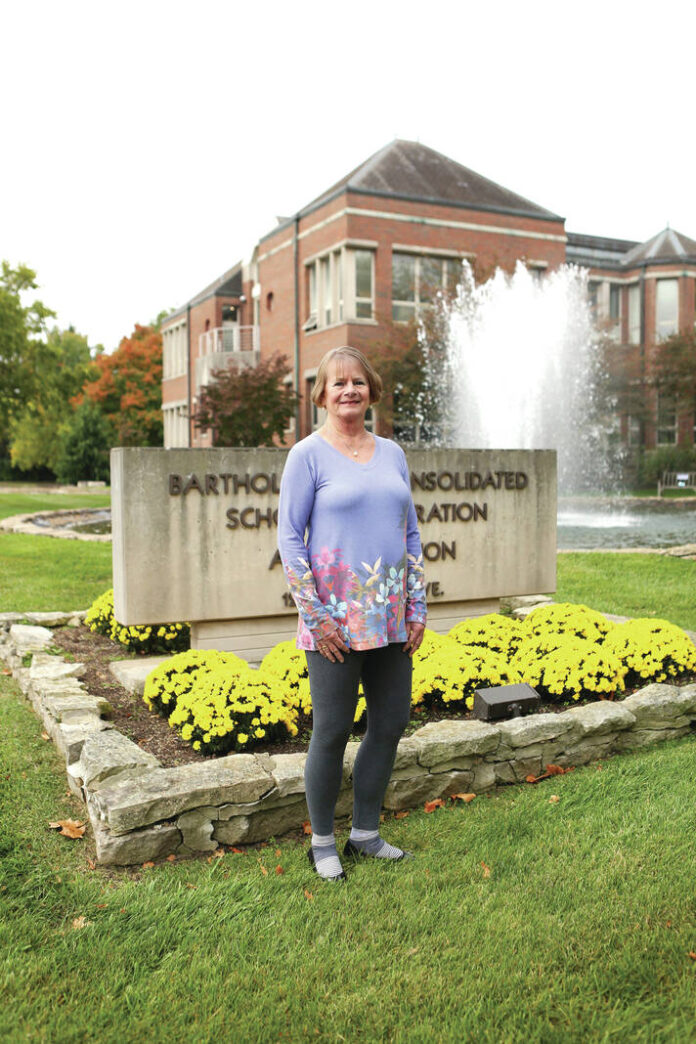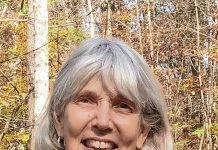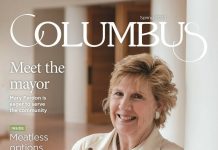
Dr. Jill Shedd, retiring member of the Bartholomew Consolidated School Corporation Board of Trustees, poses for a photograph at the BCSC Administration building, Wednesday, October 12, 2022. Carla Clark | For The Republic
Looking back, 2006 was a watershed year for the Bartholomew Consolidated School Corp.
“We were in turmoil at that time,” said John Quick, then a third-year superintendent who felt the 7-member BCSC Board of Education was not consistently adhering to the Indiana School Board Code of Ethics.
Additionally, board members could not find consensus.
“Every vote was 5-2,” recalled Quick, who retired as superintendent in 2016.
Quick felt it was critical for the district to forge a new path.
One avenue was the May 2006 school board election, with four of seven positions available on the ballot – and two incumbents deciding against re-election bids.
“We were looking for some stability and someone who could see both sides of an issue with no specific agenda or philosophy – people who were learning-centered,” Quick said.
Voters found one in newcomer Jill Shedd, who attracted 58 percent of the votes cast in District 1 on the east side of Columbus, the only race involving a board incumbent seeking re-election.
“She was well qualified,” Quick said of Shedd, an assistant dean for teacher education in the Indiana University School of Education since 2000.
Besides that, Quick said: “She had integrity.”
Shedd understood that a board member’s role was to set policy and demonstrate leadership.
“She was unflappable in a board meeting,” Quick said of Shedd, elected by her peers to serve as board president six times, including her final two years.
“She was so respected; she was never challenged again,” Quick said, referring to her unopposed victories in 2010, 2014 and 2018.
But after 16 years on the BCSC school board, tied for the second-longest stint ever – behind Ray Zeigler’s 24 years – Shedd will soon step away at age 69.
That decision coincides with the Columbus woman’s decision to retire next summer from her full-time job with Indiana University, where she has worked since 1977.
“I encouraged her to run again. But I understand, it’s time,” Quick said. “Sixteen years, that’s above and beyond.”
In Bloomington, Shedd works with education majors who are training to become teachers – a critical role considering the teacher shortage facing school districts across America.
Ironically, Shedd had planned to become a geography teacher herself. But with hundreds of candidates for each opening in her hometown of Indianapolis in 1976, she was unable to turn her Northwestern University diploma into a full-time classroom position.
Shedd initially took a secretarial job working for NASA, which had an office in the IUPUI building. After about 6 months, she landed a permanent support staff position at the nearby Indiana University School of Medicine, which launched Shedd’s 45-year IU career in administrative roles in the fields of medicine and education.
As assistant dean for teacher education, Shedd manages the IU undergraduate program, overseeing the curriculum and working with students through individual academic issues.
Why Columbus?
Shedd moved from Indianapolis to Columbus in 1991 when her husband at the time accepted a new position with a local medical practice. Rather than commute to Indianapolis each day for her own work, Shedd had a second option and she chose to transfer to IU in Bloomington.
For Shedd, it allowed her professional and personal lives to be separate.
In 2006, retired board member Zeigler approached IU administrator Shedd about getting more personally involved in her community by running for school board.
Judy Owen, a colleague in Bloomington and a board member in Spencer-Owen Community Schools, northwest of Bloomington, said: “Jill, you can do this.”
However, she needed permission from IU to seek office.
“Oh, you decided to go into politics,” Shedd quoted her then-School of Education dean, Gerardo Gonzalez, as saying at the time.
Shedd said that took her somewhat aback, as Indiana school board candidates run as non-partisan candidates.
“I really didn’t think of it as political,” Shedd said. “I saw it as guiding the work of the school corporation.”
But in time, Shedd would indeed experience political backlash as a school board member.
In 2016, when the BCSC board updated its anti-discrimination policy to include the words “gender identity” as a protected class, dozens of parents expressed concern about transgender students using restrooms that did not align with their biological gender. The wording change updated transgender protection that had been put into place locally in 2013.
Parents opposed to the change who addressed the BCSC board in public meetings worried that it could allow predators to take advantage of unsuspecting students in school restrooms. A few parents threatened to pull their children out of BCSC schools.
During a July 2016 meeting, Shedd explained that the board took the action it believed would be in the best interests of all students, including those struggling with gender dysphoria, and that each situation involving a transgender student would be addressed individually.
“That was not the best image of this community,” Shedd said.
“In the last four years, it has become increasingly political and partisan,” Shedd said of the business of running schools – on both local and national stages.
During the summer and fall of 2021, BCSC board meetings became tense and lengthy during public debate over COVID-19 protocols.
According to a statement from BCSC, that September, in response, the board began conducting virtual board meetings with limited public comment due to “episodes of threatening behavior, profanity used during meetings, personal attacks directed toward various individuals and non-compliance to meeting protocols that include: maintaining appropriate physical distancing, wearing masks and following public comment guidelines and a substantial interference with the ability to conduct necessary business.”
“We were persistent and consistent in giving everyone a voice, but at the end of the day all of us on the board felt it was important to follow national CDC (Centers for Disease Control and Prevention) and community guidelines. The hospital did not have room for a flood of people to get ill,” Shedd said. “I appreciated parents wanting to be responsible for their children, but we had to make decisions for 11,000 children.”
Shedd said she sees the role of board members as “striving to represent our community well and to give us the best schools we can.”
For the Columbus-based district, that benchmark started with Universal Design for Learning, which is an overarching framework for teachers to think through and design classroom environments and lessons to make sure they reach each and every learner.
BCSC was among the few groundbreaking school districts nationwide to use Universal Design for Learning.
“UDL was just taking shape in 2006, just when I joined the board,” Shedd said.
That year, Shedd traveled to California to observe a school district where a new-technology educational concept was already in operation. She came back with recommendations on how BCSC should launch something similar at a third local high school.
“She brought back the ideas of it being a stand-alone campus, limiting enrollment to the high school of 400 and being true to the model,” Quick said. “She had done the work.”
Columbus Signature Academy – New Tech High School became a reality when it opened in 2008.
Karen Garrity, who was BCSC’s director of elementary education, began asking why this type of innovative learning environment was only being considered at the high school level. Afterward, local middle school and elementary school programs featuring project-based and individualized learning would also be implemented.
What’s next?
After she retires, Shedd will be moving full time to Orcas Island – known for its whales by the same name – in the state of Washington, where she has also owned a home for the past seven years.
Her son, Taylor, developed a strong interest in Orca whales when he was in middle school, and the Shedd family would vacation there during the summer.
With an interest in nature and environmental issues, Shedd looks forward to spending time in the three national parks that will be nearby.
“I plan to do a lot of hiking and reading,” she said.
The latter is a hobby Shedd has enjoyed the past 30 years in Columbus as a member of the Book Friends book club, which meets monthly in members’ homes.
“She’s very soft-spoken, but gets her point across,” said fellow club member, Sharon Baldwin, a member since 1985.
“Shedd’s empathy for others and thoughtfulness stand out,” Baldwin said.
When Shedd leaves Columbus next year, her most cherished memories will stay close to her heart.
“This is where my boys grew up. Their experiences, their friends and then the friends that I have,” she said, wiping away a tear.
“There’s no question people appreciate and value what’s special about Columbus. There is something equally special about this school corporation – what it offers, what it has accomplished,” Shedd said. “I hope that people will always recognize its value and how important it is. I know it will continue to be as creative and innovative as it always has been.”
Jill D. Shedd
Age: 69
Family: Son, Kyle Shedd, and his wife Rachel of Anchorage, Alaska; son, Taylor Shedd, and his wife Hillary, Loveland, Colorado; two granddaughters.
Hometown: Indianapolis, through 1964
Residence: Columbus, since 1991
Education: Bachelor of Science in Education, Northwestern University, Evanston, Illinois, 1976; Master of Science in College Student Personnel Administration, Indiana University, Bloomington; Ph.D. in Educational Inquiry and Higher Education, Indiana University, Bloomington, 1987.
Career: Administrative assistant, Office for Student and Curricular Affairs, Indiana University School of Medicine, Indianapolis, 1977-1981; director, Educational Support Programs, Indiana University School of Medicine, Indianapolis, 1981-1984; assistant to associate dean, Indiana University School of Education, Indiana University Purdue University Indianapolis (IUPUI), Indianapolis, 1986-1987; associate for research and development, Indiana University School of Education, IUPUI, Indianapolis, 1987-1988; director of student teaching and field experiences, assistant director of academic affairs, Indiana University School of Education, IUPUI, Indianapolis, 1988-1991; acting director of research and development, The Center for Urban and Multicultural Education, Indiana University School of Education, IUPUI, Indianapolis, 1991; assistant dean for University Relations, coordinator of Distance Education Program, Indiana University School of Education, Bloomington, 1991-2000; assistant dean for teacher education, Indiana University School of Education, Bloomington, 2000-present.
Professional service: Executive board member, Indiana Association of Colleges for Teacher Education (IACTE), 1998-present; president, IACTE, 2001-2002; executive director, IACTE, 2004-present; member, Bartholomew Consolidated School Corporation Board of School Trustees, 2006–present; member, Columbus Sunrise Rotary Club, 2002-2011.
Longest-serving BCSC board members
■ Ray Zeigler, 24 years, 1980-2004
■ Louise Dalton, 16 years, 1974-1990
■ Jill Shedd, 16 years, 2006-2022




